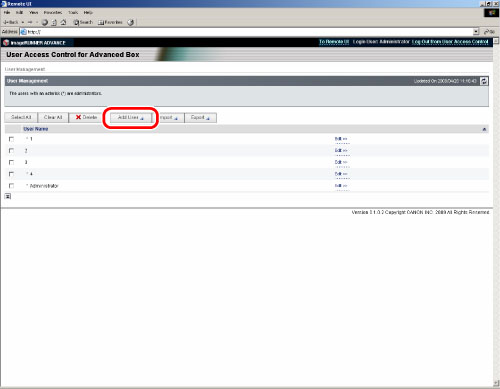Preface
Enhanced Efficiency
The imageRUNNER ADVANCE features numerous functions enabling you to perform such convenient operations as scanning paper documents, outputting data, and sending/receiving faxes.
The imageRUNNER ADVANCE is designed to meet your needs whilst streamlining workflow, greatly enhancing the productivity of your business.
Customization
The imageRUNNER ADVANCE incorporates a user-friendly touch display panel that can be customized to suit the needs of the individual or office environment. This practical feature enables users to customize the layout of the display, as well as register frequently performed operations on the Quick Menu, ensuring that every user experiences remarkable efficiency.
Reduce TCO
In today's highly-competitive global market, cost savings are more crucial than ever. The total cost of ownership (TCO) must be taken into consideration when a business invests in office equipment. A positive bottom line and improved efficiency can be achieved by reducing the cost and workload involved in transmitting information. Operating a network of imageRUNNER ADVANCE systems enables you to share address books for uniform management, and even share the fax function of another imageRUNNER ADVANCE machine using the Remote Fax function.
Data Security
Robust security is vital to all businesses.
The imageRUNNER ADVANCE incorporates a secure watermark function to restrict the misuse of output documents. In addition to this, security solutions are offered for various operations, such as printing and transmitting data.
Required Settings
To use the various functions described in this manual, depending on the function, you may need to specify certain settings in advance using one of the following three methods:
Settings/Registration
This method enables you to specify the settings required to perform network-related operations such as using Internet fax (I-fax) and e-mail, configuring fax forwarding settings, and accessing the Advanced Spaces of other imageRUNNER ADVANCE machines. You can also set security-related functions by browsing through the directory levels which are grouped by purpose.
The items available in Settings/Registration vary for the administrator and general user.
The system manager or the SSO-H (Single Sign-On H) Administrator can specify all of the system settings for the machine. For information on the types of administrators, see "Administrator Settings."
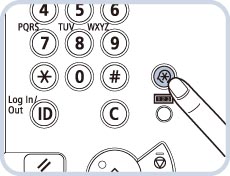 |
 |
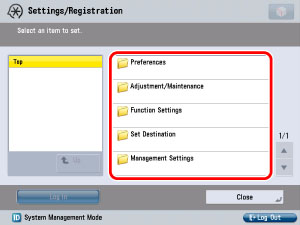 |
System Manager Information (System Manager Department ID/System PIN) is set by default in the machine. Thus, the Administrator must log in by entering the System Manager ID and the System PIN on the Settings/Registration screen. The default settings for the system manager department ID and system manager PIN are both "7654321." These should be changed to more suitable values.
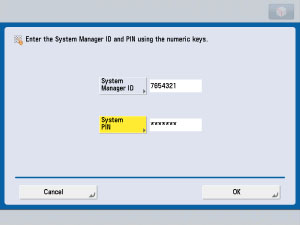
Items Requiring Prior Confirmation
Check the following items when specifying settings:
|
Item
|
Sample Setting
|
Setting Method
|
|
IPv4 Address of the Machine
|
172.24.156.11
|
Press
 → [Preferences] → [Network] → [TCP/IP Settings] → [IPv4 Settings] → [IP Address Settings] → [Preferences] → [Network] → [TCP/IP Settings] → [IPv4 Settings] → [IP Address Settings] |
|
Subnet Mask of the Machine
|
255.255.255.0
|
|
|
Gateway Address of the Machine
|
172.168.1.254
|
|
|
Primary Server of the Machine
|
10.120.5.11
|
Press
 → [Preferences] → [Network] → [TCP/IP Settings] → [DNS Settings] → [DNS Server Address Settings] → [Preferences] → [Network] → [TCP/IP Settings] → [DNS Settings] → [DNS Server Address Settings] |
|
Secondary Server of the Machine
|
10.120.10.55
|
|
|
Host Name
|
imageRUNNER ADVANCE
|
Press
 → [Preferences] → [Network] → [TCP/IP Settings] → [DNS Settings] → [DNS Host/Domain Name Settings] → [Preferences] → [Network] → [TCP/IP Settings] → [DNS Settings] → [DNS Host/Domain Name Settings] |
|
Domain Name
|
Smc.co.jp
|
|
|
E-mail Address of the Machine
|
iRADV@smc.co.jp
|
Press
 → [Function Settings] → [Send] → [E-Mail/I-Fax Settings] → [Communications Settings]. → [Function Settings] → [Send] → [E-Mail/I-Fax Settings] → [Communications Settings]. |
|
SMTP Server
|
SMTPSV.smc.co.jp
|
|
|
POP Server
|
POPSV.smc.co.jp
|
|
|
POP Address: Login Name
|
Air
|
|
|
POP Password
|
ACC123
|
Your Computer
Using your computer, you can install the printer driver, as well as specify various print settings. The printer driver can be installed using the CD-ROM accompanying the machine, or via the Internet. You can also create shared folders to store and share scanned documents.
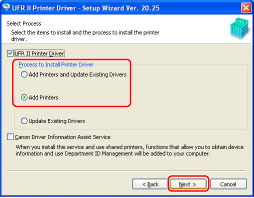 |
 |
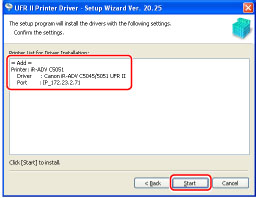 |
Web Browser
Using the Web browser installed in the computer you are using, you can perform various operations including specifying settings, restarting the machine, and switching the authentication method.
Remote UI:
Configure [Settings/Registration] from your desk.
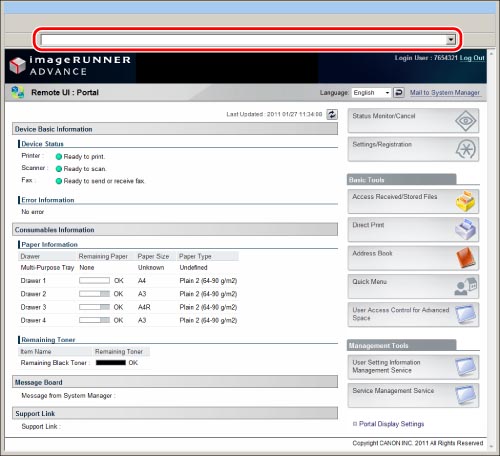
Conditions
Network settings are set.
Press  → [Preferences] → [Network] → [TCP/IP Settings] → set [Use HTTP] to 'On'.
→ [Preferences] → [Network] → [TCP/IP Settings] → set [Use HTTP] to 'On'.
 → [Preferences] → [Network] → [TCP/IP Settings] → set [Use HTTP] to 'On'.
→ [Preferences] → [Network] → [TCP/IP Settings] → set [Use HTTP] to 'On'. Press  → [Management Settings] → [License/Other] → set [Remote UI] to 'On'.
→ [Management Settings] → [License/Other] → set [Remote UI] to 'On'.
 → [Management Settings] → [License/Other] → set [Remote UI] to 'On'.
→ [Management Settings] → [License/Other] → set [Remote UI] to 'On'.System Requirements
Windows
|
Compatible OS
|
Compatible Web Browsers
|
|
Windows XP
Windows Vista Windows 7 |
Internet Explorer 6, or later
|
Macintosh
|
Compatible OS
|
Compatible Web Browsers
|
|
Mac OS X v10.3, or later
|
Safari 1.3.2, or later
|
SMS (Service Management Service):
Switch the authentication method for your machine.
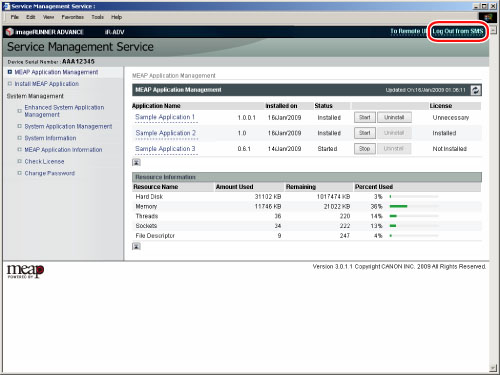
Conditions
Network settings are set.
Press  → [Preferences] → [Network] → [TCP/IP Settings] → set [Use HTTP] to 'On'.
→ [Preferences] → [Network] → [TCP/IP Settings] → set [Use HTTP] to 'On'.
 → [Preferences] → [Network] → [TCP/IP Settings] → set [Use HTTP] to 'On'.
→ [Preferences] → [Network] → [TCP/IP Settings] → set [Use HTTP] to 'On'.A key pair and server certificate preinstalled in the machine are set as the default key.
Press → [Preferences] → [Network] → [TCP/IP Settings] → [SSL Settings] → select [Default Key] (the preinstalled key pair and server certificate) in [Key and Certificate] → press [Set as the Default Key].
→ [Preferences] → [Network] → [TCP/IP Settings] → [SSL Settings] → select [Default Key] (the preinstalled key pair and server certificate) in [Key and Certificate] → press [Set as the Default Key].
Press
 → [Preferences] → [Network] → [TCP/IP Settings] → [SSL Settings] → select [Default Key] (the preinstalled key pair and server certificate) in [Key and Certificate] → press [Set as the Default Key].
→ [Preferences] → [Network] → [TCP/IP Settings] → [SSL Settings] → select [Default Key] (the preinstalled key pair and server certificate) in [Key and Certificate] → press [Set as the Default Key].System Requirements
Windows
|
Compatible OS
|
Compatible Web Browsers
|
|
Windows XP Professional SP3
|
Windows Internet Explorer 7
|
|
Windows Vista SP2
|
Windows Internet Explorer 8
|
|
Windows 7
|
Windows Internet Explorer 8
|
Macintosh
|
Compatible OS
|
Compatible Web Browsers
|
|
Mac OS X v10.3
|
Safari 1.3.2
|
|
Mac OS X v10.4
|
Safari 2.0.4
|
|
Mac OS X v10.5
|
Safari 3.1.2
|
|
Mac OS X v10.6
|
Safari 4.0.3
|
User Access Control for Advanced Space:
An authentication application that manages the user information for Advanced Space users.
